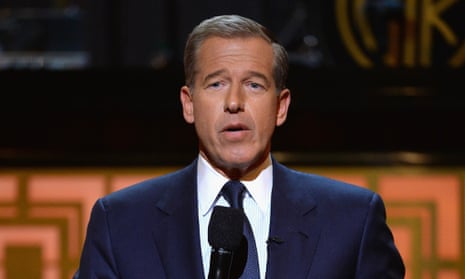Fame, money and power aside, it’s hard not to feel a little twinge of pity for NBC anchor Brian Williams’ admission that he was never under fire in a Chinook helicopter in Iraq, all his former anecdotes to the contrary. He will probably lose his job for clumsily doing what countless others have in the past. War hangers-on have worked hard for centuries to suggest they’ve seen combat, and you can go to a meat-market bar near any American military base and probably find some rear-echelon motherfucker telling you what it was like taking live fire, even if he really was just the post meteorologist, jockeying a plasma screen.
That ageless impulse to seem as though you were once close to the danger has in recent decades joined in a demeritorious union with the danger, for a reporter, of seeming to be distant – or even divisible – from the experience of the troops. MSNBC’s Chris Hayes got in a lot of trouble by explaining his discomfort with blanket labeling of all troops as “heroes”. One might have expected that the existence of Abu Ghraib or Haditha would make Hayes’ qualifying tone not only the default approach but the only thing close to objectivity; instead, journalists who wanted to show no daylight between themselves and the troops roasted Hayes on the latter’s behalf.
The lesson learned then – and one many others learned even at the start of the wars that have thus far defined the use of American power for this millennium – is that a war journalist is better off being indistinguishable from one of the troops than strictly reporting on them. In a sense, Brian Williams’ telling of tall tales presents little more than the combat version of putting what his audience – us – want to see on a resume.
The slow absorption of war conduct, war reporting and warrior reporter into one organism of planning and promotion has been going on for decades, and you can make a good case that reporting and even war planning have suffered for the symbiosis. During WWII, various branches of the military and even individual commanders hired advertising firms to make sure they got their “credit”. On the comic side, this led to John Wayne’s The Fighting SeaBees, a movie about the Navy’s construction battalions (CBs) getting their “due”. More corrosively, you saw megalomaniacs like Douglas MacArthur conducting themselves as if there were a nest of Cecil B De Milles embedded in every treeline; were he active today, his verified Twitter account’s social media coordinator would be tweeting, “Gen D-Mac v on fleek retaking the Philippines. These islands will always be bae.” It’s the inevitable result of reporting-as-promotion in an environment where most operational details are already classified or undisclosed.
America’s wars in Iraq and Afghanistan elevated this military-media symbiosis to a kind of perverse efficiency of polite fictions and occasional farce. In 2003, the establishment press engaged in proper handwringing over whether embedding journalists within companies of combat troops would compromise their reporting. Of course it did. Novel information was rare and seemed to only come off-script by those more concerned with their own self-promotion than the soldiers they were there to promote: think of Geraldo Rivera bone-headedly mapping out troop dispositions on live TV. Even an insightful and critical memoir like Dexter Filkins’ The Forever War shows its writer’s reluctance to be critical of people tasked with his protection and with whom he ultimately becomes a functional if non-lethal part of a whole unit. Scenes in it of a US military unit offering to auction off a blonde woman to an Iraqi village in order to clear it of guns are written as unique slice-of-life improvisational tactics, but the troublesome implications of trading in racial tropes, women’s subservience even the dehumanization of the locals are mostly left as potential conclusions for the reader to draw.
Or consider Michael Hastings’ Rolling Stone exposé of General Stanley McChrystal and his aides making insubordinate comments about the Commander-in-chief and the Vice President. Generals trashing their civilian overlords is nothing new; McClellan was so disgusted with Lincoln during the Civil War that he challenged him for the presidency in 1864. It didn’t matter that Lincoln’s strategy was ultimately correct; many in the staff officer corps never got past the idea that he never should have been able to formulate one in the first place. McChrystal and his aides were just recycling the old General Jack D Ripper line that, “War is too important to be left to politicians. They have neither the time, the training, nor the inclination for strategic thought.”
What was eventually scandalous wasn’t the thought; it was that Hastings reported it. McChrystal presumed that his embedded reporter’s job was doing public relations, not serving the public trust.
If anything, it’s often a boon to the careers of journalists like Hastings just to be in the room with someone like McChrystal; they gets their war cred. There are otherwise few democratic or civilian ways left for the war reporter to be authentically “in the shit” anymore other than to enlist. Edward R Murrow could live in London and report on a war because the Blitz came to him. Eric Sevareid could watch the fall of Paris because his war credentials consisted of already being a correspondent who’d gone to school and lived there. Conditions like that will never come to the Beltway warrior reporter or even to most foreign correspondents unless the Acela starts getting shelled.
In a sense, then, Brian Williams’ problem is of his – and our – own creation, the flip side of the problem Chris Hayes dealt with when suggesting he wasn’t sure every single soldier was a hero. If reporting on troops is still a monoculture developed via government-approved embeds and nurtured by the shaming voices of other media who deem any skepticism about official narratives – or any impulse to evaluate combat and soldiery on an individual rather than collective basis – to be dangerously close to a stab-in-the back, then, for many, the only thing to do is to enlist, even temporarily.
Besides, moments of authentic skepticism will disappear down the memory hole for all but the castigated journalist torn apart for voicing them. Pat Tillman was celebrated at this year’s Super Bowl – held in his home state of Arizona – without anyone even re-reporting of his death via friendly fire and the orchestrated cover-up of the circumstances surrounding it. The same media aflutter about NBC Nightly News anchor Brian Williams’ helicopter ride fibs seems to have entirely forgotten that, in 2003, NBC aired the factually-indifferent TV movie Saving Jessica Lynch practically moments after her bandages came off.
The really dumb, pitiable thing about Brian Williams’ circumstance today is that he felt he had to do it at all – that his maleness or reportage or patriotism would be enhanced by it. But death doesn’t need a punch-up or rewrite. Nearly 20 years ago, I stood outside a club in New Haven, Connecticut, and some argument resulted in a bunch of handgun fire, and I dove in full chickenshit mode behind a car. It would be infinitely sexier to claim that someone standing next to me took a bullet. (They didn’t.) It would be sexier still to claim that I was in the coffeehouse a block away that got shot-up in retribution. (I wasn’t; I’d left it five minutes before.) But all of that is scary stuff without elaboration.
Being shot near is abnormal enough to hold people’s attention; it’s sad that Brian Williams seemed to think he wasn’t taking a brave enough risk by merely flying over one of the most dangerous cities in the world, in the same kind of vehicle that had been shot down merely an hour before. That he felt he needed to claim to be in that other vehicle and “incapable” of remembering whether it was struck with a goddamn rocket is just dumb as hell.
But what’s especially silly – and what will make his firing sillier still – is that he felt a kind of duty to “authenticity” to zero the distance between himself and the troops. In the very climate that he and other media members helped foster (the one in which all soldiers are heroes by default), the solemnity of his war reporting comes with the prerequisite that he seem, at least in one or two telegenic moments, indivisible from the heroes around him.
Maybe it speaks to some defect in Brian Williams’ character that he felt he needed to be a character as much as a reporter – like his sideshow gigs of being the Disembodied Head of Brian Williams on the TV wall behind Jon Stewart on The Daily Show, or being yet another mega-Springsteen fan journalist, or being a nine-time recurring guest gig on 30 Rock as himself. Given all of that, maybe Brian Williams putting on fatigues was just another form of dress-up and being liked.
There was another option for him – there always was – but, depending on how you define the word, it was always a lot more dangerous. Brian Williams could have renounced feel-good features on the “regular joes” feeding a war machine revved up on lies and focused instead on the lies endangering them. He could have reported more on non-heroes – both the desk bound creators of the war or the volunteers of questionable stability who make the Hadithas every time. Or he could have reported on heroes who worked as contractors for the American occupation and were left behind in a radicalized nation without Uncle Sam’s backing or, even better, on the black-books contractor class that took US payouts and did their jobs with minimal inconvenience and maximal collateral damage.
All of that is less fun and more threatening to one’s contract than a sexed-up trip in a whirlybird in a warzone, but it’s reporting too. Edward R Murrow had his war reporting moment, but then he made a second one by fighting a cynical patriotic narrative in service to posterity and at great risk to himself. Not everyone can do that, but failure at the attempt is nobler than a successful joyride. Besides, it seemed to work out for him all right.

